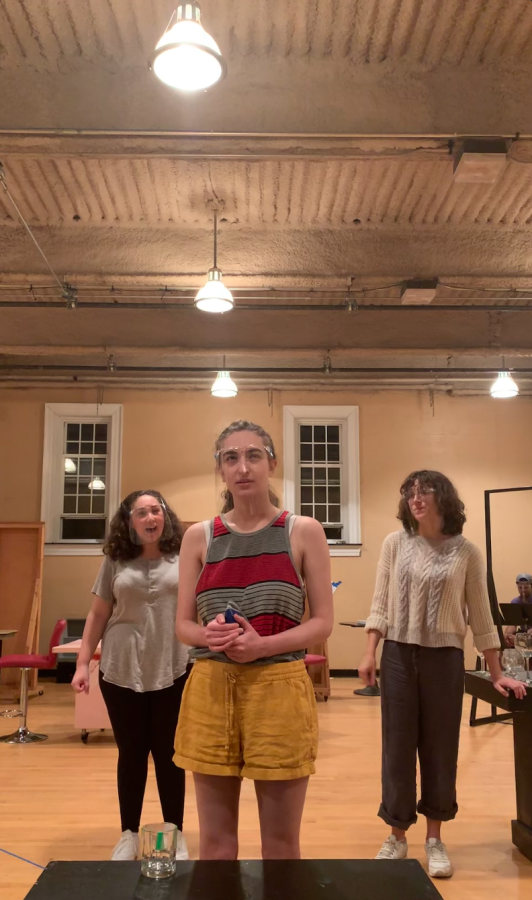Theatre Department kicks off theatrical season with ‘Smell of the Kill’
From left to right: Josie Schoenberg, Naomi Caplan, and AllyThring rehearse in the Acting Studio on Oct. 12.
Three husbands. Three wives. One meatlocker. What could possibly go wrong?
Despite a number of COVID-related setbacks, the Guilford College Theatre Studies Department will begin its season with Michele Lowe’s play “Smell of the Kill,” opening Oct. 28 and running for two consecutive weekends. The three-woman show features actresses Ally Thring, Naomi Caplan and Josie Schoenberg, and is directed by Beth Ritson.
“Smell of the Kill” is a short, one-act show centered around three deeply unsatisfied wives in mid-1990s Chicago. What starts off as an evening of bickering and complaining about their husbands suddenly takes a gruesome turn, and the three women are forced to make the most important decision of their lives. The dark comedy is ultimately an examination of the modern institution of marriage and has been lauded by publications such as Variety, Newsday, and The Advocate.
Guilford’s decision to revert to Phase Two produced huge amounts of anxiety within the cast, according to Schoenberg.
“There were some real nerves about what rehearsal would look like going forward, if it would go forward, (and) if there would be a show,” said the sophomore theatre minor.
The rest of the cast echoed her with their anxieties during the COVID spike.
Since the outbreak of COVID-19, the pandemic has significantly curtailed theatre shows and classes at Guilford.
“It’s so difficult to have a…full theatre experience over Zoom,” said Thring. “When the pandemic hit, we were about two weeks away from putting up an all-female Hamlet…it was devastating as we all slowly started to realize that the show wasn’t going to happen, and our work would never be seen by the (wider) community.”
COVID has also impacted the technical and design elements of the production.
“One of the biggest hurdles, honestly, is the cost of lumber has gone up drastically since COVID,” said Amanda Warriner, the technical director for the show.
Lumber is vital in set construction, used to construct the deck (or floor of a stage), flats (walls), and any furniture or set pieces which cannot be outsourced.
Other crew members have been inconvenienced by the pandemic as well.
“Just the other day we were delayed because the paint and hardware stores didn’t have the paint and wood that we needed in order to achieve the design,” said senior theatre major Sarah Seguin, who is both set designer and production manager for the production. “This really adds to the construction time because it becomes a waiting game for when the store will have what we need.”
In order to make up for lost time, long work calls are being held frequently in Sternberger Auditorium to complete painting and construction. The process is almost entirely student-run and organized.
Gretchen Waldorf, another senior theatre major, says of the workload, “It’s a lot. We work for five or six hours…only to come back the next day and do it again. Losing a week’s worth of time was pretty devastating.”
Despite these obstacles, the production process has seen a massive amount of student engagement and leadership. For example, set designer Seguin spent the past summer designing a complex set and “Smell of the Kill” is her thesis. Freshman Ellie Dieth is in charge of identifying and purchasing props, and senior Matthew Climbingbear is stage managing. The show itself was picked by the senior students (Thring, Caplan and Seguin) to serve as their capstone project, and students have remained responsible for generating ideas and working collaboratively throughout the process.
“I really want to encourage any students who can, to come and attend,” Seguin said in an email interview. “I would love the public to know that so many of their peers and fellow students have been working hard on this show. This doesn’t just happen with one person and it takes an army for any show to be produced.”
“Smell of the Kill” will be presented in Sternberger Auditorium on Oct. 28, 29, 30, and Nov. 4, 5, 6 at 7:30. Admission is $2 for Guilford community members and $5 for general admission.










